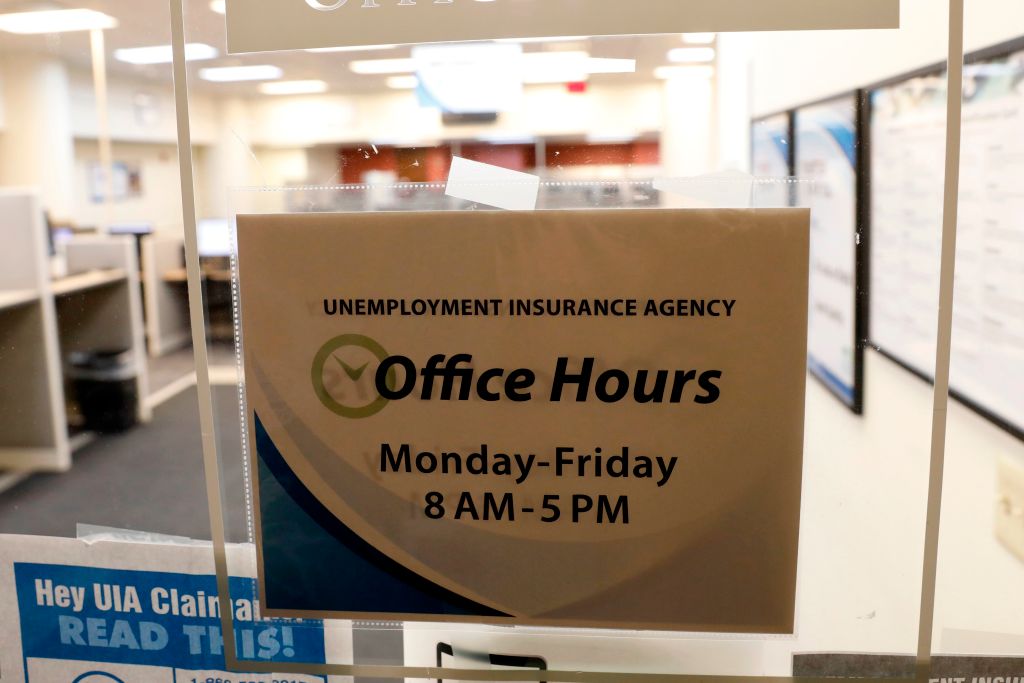Economists suggest a state backlog could explain why new unemployment numbers are still so high


A free daily email with the biggest news stories of the day – and the best features from TheWeek.com
You are now subscribed
Your newsletter sign-up was successful
Falling unemployment claims might be even lower than they appear.
Around 1.5 million Americans filed for unemployment benefits last week, according to Labor Department numbers released Thursday, narrowly beating economists' expectations of 1.6 million. That's down from 1.8 million the week before, and due to backlogs of unemployment claims still piled up in some states, some economists think the real numbers could be even smaller, Politico reports.
With more than 40 million Americans filing unemployment claims over the past three months, several states have had trouble keeping up. Wisconsin reported a backlog of 100,000 still-unprocessed claims on Wednesday, and Oregon even brought in the National Guard to help file. As of last week, Bloomberg reports that a third of unemployment benefits totaling close to $70 billion have yet to be paid. That backlog could mean many of this week's claims were actually filed a while ago and that the economy is looking a little better than it seems — not that adding to past weeks' exploding jobless numbers is necessarily a good thing.
The Week
Escape your echo chamber. Get the facts behind the news, plus analysis from multiple perspectives.

Sign up for The Week's Free Newsletters
From our morning news briefing to a weekly Good News Newsletter, get the best of The Week delivered directly to your inbox.
From our morning news briefing to a weekly Good News Newsletter, get the best of The Week delivered directly to your inbox.
Still, Adam Ozimek, the chief economist at freelance recruiting business Upwork, thinks the whole total can't be attributed to backlogs. "We are 12 weeks into this," he tweeted, and predictions from another pair of economists continue to accurately predict unemployment totals each week based on Google searches. But Ozimek does note that this "is not a normal labor market," and it's hard to say for certain what's happening because "we don't know what an entire economy frozen for almost three months and then slowly thawed will look like."
A free daily email with the biggest news stories of the day – and the best features from TheWeek.com
Kathryn is a graduate of Syracuse University, with degrees in magazine journalism and information technology, along with hours to earn another degree after working at SU's independent paper The Daily Orange. She's currently recovering from a horse addiction while living in New York City, and likes to share her extremely dry sense of humor on Twitter.
-
 Quiz of The Week: 14 – 20 February
Quiz of The Week: 14 – 20 FebruaryQuiz Have you been paying attention to The Week’s news?
-
 The Week Unwrapped: Do the Freemasons have too much sway in the police force?
The Week Unwrapped: Do the Freemasons have too much sway in the police force?Podcast Plus, what does the growing popularity of prediction markets mean for the future? And why are UK film and TV workers struggling?
-
 Properties of the week: pretty thatched cottages
Properties of the week: pretty thatched cottagesThe Week Recommends Featuring homes in West Sussex, Dorset and Suffolk
-
 TikTok secures deal to remain in US
TikTok secures deal to remain in USSpeed Read ByteDance will form a US version of the popular video-sharing platform
-
 Unemployment rate ticks up amid fall job losses
Unemployment rate ticks up amid fall job lossesSpeed Read Data released by the Commerce Department indicates ‘one of the weakest American labor markets in years’
-
 US mints final penny after 232-year run
US mints final penny after 232-year runSpeed Read Production of the one-cent coin has ended
-
 Warner Bros. explores sale amid Paramount bids
Warner Bros. explores sale amid Paramount bidsSpeed Read The media giant, home to HBO and DC Studios, has received interest from multiple buying parties
-
 Gold tops $4K per ounce, signaling financial unease
Gold tops $4K per ounce, signaling financial uneaseSpeed Read Investors are worried about President Donald Trump’s trade war
-
 Electronic Arts to go private in record $55B deal
Electronic Arts to go private in record $55B dealspeed read The video game giant is behind ‘The Sims’ and ‘Madden NFL’
-
 New York court tosses Trump's $500M fraud fine
New York court tosses Trump's $500M fraud fineSpeed Read A divided appeals court threw out a hefty penalty against President Trump for fraudulently inflating his wealth
-
 Trump said to seek government stake in Intel
Trump said to seek government stake in IntelSpeed Read The president and Intel CEO Lip-Bu Tan reportedly discussed the proposal at a recent meeting
